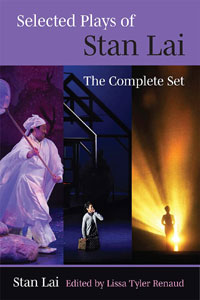|

Featuring twelve plays translated from Chinese by the playwright, Selected
Plays of Stan Lai opens grand new vistas to English-speaking practitioners
and students of theatre. Elegantly edited by Lissa Tyler Renaud, this three
-volume collection (University of Michigan Press: Ann Arbor, 2021) is an
essential addition to any theatre library, providing Western artists and scholars
with unprecedented access to a singular trove of artistic riches.
Lai, the most performed playwright in the Chinese world, has been writing,
directing, and producing for nearly four decades, primarily with his company,
Performance Workshop, in Taiwan. The pieces selected for translation and
publication in this collection span much of the length of his career.
The plays themselves are, of course, the central attraction, but it would be a
mistake to skip the substantive front matter. Setting the context are an
introduction to the publication as a whole, written by Tao Qingmei and
translated by Hongyi Tian, along with individual introductions to each
volume—the first by this same team, and the second and third by Raymond
Zhou. Lai's essay "How I Wright Plays" in the introductory material will be of
special interest to artists who work wholly or partly through a devising process
. His earlier plays in particular were developed through guided improvisation
with a select group of actors. Western practitioners will marvel at the time and
patience invested in what Lai calls the "wrighting" of his plays, which is largely
inseparable from his work as a director. The scripts often reflect the
spontaneity of actors' contributions in both their freewheeling structure and
the energetic give-and-take within scenes. Lai also shares a brief but
fascinating note on his translation process, illuminating the complex demands
of writing for an audience's ears while maintaining both literal and associative
meanings.
Comparisons may be of limited usefulness, but as a reader fairly new to
Sinophone theatre, I found myself looking for reference points in traditions
with which I'm familiar. In spirit, Lai's plays feel close to Elizabethan theatre:
dramaturgy by accrual, with tight interweaving of high and low diction,
tragedy and comedy, the everyday and the supernatural. The reader senses
ambition on a global scale, even in moments of personal drama or domestic
comedy. An artist of Lai's caliber doesn't live through the monumental political
shifts of the past half century without that movement animating his work.
Every play and virtually every scene reflects a keen interest in the old and the
new. I am challenged to think of another dramatist, with the possible
exception of Anton Chekhov, whose work looks so intently both forward and
back, highlighting at once the temptation to obliterate history and the danger
of trying to do so.
One of Lai's most literal and pointed explorations of past and present takes the
form of I Me She Him, which appears in Volume I. First performed in 1998,
this tightly focused, relatively small-cast comedy wields its metaphors boldly.
As the action begins, financiers More, a complacent middle-aged CEO from
China, and Jing, a slick Taiwanese executive, prepare for a high-stakes meeting
and potential merger, only to be thrown off track by the sudden appearance of
younger versions of themselves, idealistic and open-hearted. After capitalizing
on the comic confusion that results, the action escalates when the two high
-rollers are forced to confront their shared passionate and painful history. The
tensions between former lovers and their respective countries climax in a swift
exchange of partially expressed confessions, perhaps reminiscent to a Western
reader of Alice Gerstenberg's Overtones or some of O'Neill's mid-career
experiments with ego and id, though with far greater cultural gravity.
Audiences familiar with classical Chinese theatrical traditions may find them
evoked throughout Lai's work, but to this reader, the plays feel powerfully
contemporary. Educated in both Taiwan and the United States, having earned
an undergraduate degree from Fu Jen Catholic University and a doctorate
from the University of California, Berkeley, Lai writes/wrights first and
foremost for the people of his homeland, but also makes nimble use of
twentieth-century Western theatrical devices in service of Chinese themes,
issues, and characters. In a post-modern gesture, Secret Love in Peach
Blossom Land marries two stylistically distinct stories to great effect, one
employing the tools of farce and the other reminiscent of mid-twentieth
-century Social Realist drama. Perhaps the play of Lai's most familiar to
American audiences, Secret Love in Peach Blossom Land was adapted as a
film in 1992 and enjoyed a bright, moving production at the Oregon
Shakespeare Festival in 2015.
A review can only begin to suggest the variety of styles and aims represented
here. Among the most piercing of the plays is the family drama Like Shadows.
Unlike most of Lai's work, it was written first in English (for a workshop at
Stanford University in 2006), then translated by the author for its Chinese
premiere (National Theatre, Taipei, 2007). Mesmerizing and elegiac, this story
of parents, daughters, and fallen angels moves stealthily between worlds, not
alerting even its own characters to what's at stake until it's too late. As a
playwright, I appreciated the structural sleight of hand; as a reader, I was
simply moved to tears.
Stan Lai's significance to Sinophone theatre cannot be overstated, and the
availability of a dozen of his plays in lively, accessible translations is a gift to
English-speaking artists, scholars, and audiences.
|